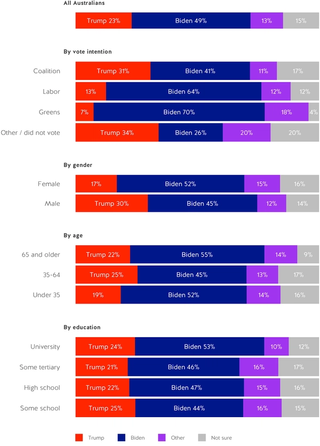New survey data collected by the United States Studies Centre suggests that in virtually every demographic and political group in Australia, the Democratic candidate Joe Biden is overwhelmingly preferred to President Donald Trump.
In late July 2019, the USSC surveyed 1,820 Australians and another 1,619 in early October 2020. In both surveys, Australians strongly preferred a Democratic win over Trump's re-election in 2020, with support for the Democratic candidate increasing over the past year.
Australians strongly prefer a Democratic win over the re-election of Trump in 2020, with support for the Democratic candidate increasing over the past year.
Australian men and Liberal and National Coalition voters were more likely to support Donald Trump than women and Labor supporters, yet even among these groups support for Biden exceeds support for Trump by double-digit margins. The same result holds over almost all demographic and political groups. The only readily identifiable group in Australia where support for Trump's re-election outpaces support for Biden are minor-party supporters and non-voters, where Trump supporters outnumber Biden supporters by eight percentage points.
Over the last year, support for President Trump's re-election increased from 20 per cent to 23 per cent among Australians. However, the increase is even greater for the Democratic candidate, with 49 per cent of respondents saying they preferred Democratic candidate Joe Biden elected president, up from 41 per cent a year ago. Some of this change may be the result of the Democratic candidate being named in this survey, with the 2019 poll asking respondents to choose between Donald Trump and a hypothetical unnamed Democrat.
Australian men and Coalition voters were more likely to support Trump than women and Labor supporters, yet even among these groups support for Biden exceeds support for Trump by double-digit margins.
Australian men are almost twice as likely to support Donald Trump, at 30 per cent compared with 17 per cent for women. However, both groups still prefer Joe Biden to President Trump. Fifty-two per cent of women and 45 per cent of men say they would rather the Democratic candidate won the election.
Across age groups, there is little variation, with support for Trump lowest among younger and older groups, and very slightly higher for those aged 35-64. In this middle group, 25 per cent say they prefer Trump, compared with 45 per cent who favour Biden. Fifty-five per cent of those 65 years old and older and 52 per cent under 35 years old say they preferred Biden, compared with 22 and 19 per cent preferring Trump respectively. Similarly, there are only small levels of variation by education. A majority of university-educated respondents (with a bachelor’s degree or higher) prefer Joe Biden, with a plurality of all other groups also preferring the Democratic nominee.
Figure 1. Change in Australians' preferred candidates for the 2020 US presidential election, July 2019 to October 2020

More respondents who voted for the Liberal-National Coalition at the 2019 Australian election (41 per cent) preferred a Biden presidency than wanted Trump re-elected (31 per cent). Support for a second Trump term ranged from seven and 13 per cent among Labor and Greens voters, to 34 per cent among those respondents who did not vote in 2019 or who supported other parties (the only group examined who preferred Trump). Among these groups, support for Biden is 70 per cent (Labor), 64 per cent (Greens) and 26 per cent (Other, Did not vote).
While Australians clearly prefer Biden becoming president to a second Trump term, Australian public opinion is not as lopsided as we have seen in other, recent US presidential elections. Ahead of the 2008 US presidential election, with a slightly differently worded question, the USSC found that 60 per cent of Australians said they would vote for Obama (if they could), with just 14 per cent supporting the Republican candidate, John McCain. Trump's level of support among Australians in our data for 2020 (23 per cent) exceeds this earlier surveyed support for McCain by nine points. At the same time, Biden is not winning hearts and minds in Australia the way that Obama's candidacy did in 2008, with Biden’s 49 per cent support from Australians significantly lagging Obama's 60 per cent.
Figure 2. Australians' preferences in the 2020 US presidential election

About the survey
The surveys were fielded between 23-29 July 2019, and 13-19 October 2020, by YouGov, a global public opinion and data company, to samples drawn from YouGov panels of respondents who have previously agreed to take surveys online. The size of the 2019 sample was 1,820, and the 2020 sample was 1,619.
These samples were formed by first segmenting the YouGov Australian panel on gender, age and region (urban/rural distinction within each state), matching the distributions of those variables in the adult, citizen Australian population provided by the 2016 census. Randomly selected panellists in each segment were invited to take the survey. After data collection, the responses were weighted to match the distributions of age, gender and region (as provided by the 2016 census, again subset to adult citizens). These two steps ensure the sample is representative of the adult, citizen population of Australia.







